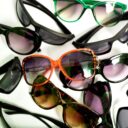Tips for Choosing Sunglasses
Available in many shapes and styles, sunglasses are more than fashion accessories – they are important tools to protect your eyes from ultraviolet (UV) rays, the radiation energy produced by the sun. UV rays are a contributing factor in developing cataracts. Did you know two types of radiation – UVA and UVB rays occur with exposure to sunlight? Ultraviolet radiation from the sun can cause cumulative damage to your eyes as you age, but you can protect your vision by wearing sunglasses every day.
Polarized sunglass lenses reduce light glare and eyestrain. Because of this, they improve vision and safety in the sun. Polarization itself does not provide UV protection. Instead, it provides a better visual experience for certain activities like driving, boating, or golfing. People who use polarized sunglasses often say they are less tired than usual after hours of battling sun glare. There are polarized lenses made with a UV-blocking substance. Check the label of polarized sunglasses to make sure they provide maximum UV protection.
On polarized sunglasses, the filter creates vertical openings for light. Only light rays that approach your eyes vertically can fit through those openings. The lenses block all the horizontal light waves bouncing off a smooth pond or a shiny car hood, for instance. As a result of this filtering, the image you see with polarized lenses is a bit darker than usual. But objects look crisper and clearer with polarized lenses, and details are easier to see.
UV Blocking and Polarization Are Not the Same
Since UV light carries more energy than visible light, it can do greater damage to our eyes. As we age, the damage simply has more time to accumulate: a cataract, (cloudiness of the lens) for example, is believed to be caused by many years of exposure to bright sunlight. Choose sunglasses with 100% UV blockage. Since you can’t tell by looking at the glasses for UV blockage. Just because glasses have a darker tint it not an indication of protection, you should always look at the label.
Tips for Choosing the Best Sunglasses
According to the American Academy of Ophthalmology (AAO), the best sunglasses offer:
- 100% UV protection
- High optical quality (lenses are free of manufacturing defects like bubbles or waves that could bother your eyes
- Scratch-resistant lenses
- A larger frame offers more coverage of eye area
A person’s lifestyle can affect their choices in sunglasses. Special features in sunglasses can include:
- Mirror coatings. These thin layers of various metallic coatings can reduce the amount of visible light entering the eyes. They are popular in high-glare environments and when combined with the wraparound feature, they can even provide added protection to the skin surrounding the eye area. UV protection, however, is not guaranteed.
- Gradient. These lenses are permanently shaded from top to bottom or from top and bottom toward the middle.
- Impact resistant. While all sunglasses must meet minimum FDA standards regarding impact resistance, no lens is truly shatterproof. Plastic lenses are less likely to shatter upon impact than glass lenses. And, polycarbonate plastic, used in many sports sunglasses, is even more impact resistant than regular plastic but scratches easily. If you buy polycarbonate lenses, look for ones /with scratch-resistant coatings.
Protection from the ultraviolet rays from the sun can occur by wearing sunglasses and a wide-brimmed hat. These two things can significantly reduce eye exposure to UVB radiation. Although cataracts are not completely preventable, their occurrence can be delayed. Smoking, avoiding excess amounts of alcohol, eating plenty of fresh fruits and vegetables may delay the formation of cataracts.
Keep in mind that if your sunglasses are labeled as blocking the sun’s harmful ultraviolet (UV) rays, it does not mean they are polarized too. Polarized lenses will have a label saying so.
To learn more about choosing the best type of sunglasses for your lifestyle, give our office a call at 724-443-6767 or 724-226-0444.
About Bissell Eye Care: John D. Bissell, OD owns and operates Bissell Eye Care servicing Northern Pittsburgh and Alle-Kiski Valley regions. With two locations to treat patients, we offer evening and Saturday appointments. Bissell Eye Care provides comprehensive eye examinations for the entire family beginning as early as 6 months, ocular disease detection and treatment, eyeglasses, sunglasses, activewear, contact lenses, and low vision examinations for those with significant vision loss. We accept most types of vision and health insurance plans. For more information, visit bisselleyecare.com or call our Bakerstown Office at 724-443-6767 or Natrona Heights office at 724-226-0444.

